1 Samuel 13 meaning explained in AI Summary
This chapter marks a turning point in Saul's reign, shifting from early successes to disobedience and ultimately, the loss of God's favor.
Saul's Early Reign and Mistakes:
- Time Passes: The chapter begins by noting that Saul has been king for one or two years (the exact translation is debated) and has established a small standing army.
- Jonathan's Victory: Saul's son, Jonathan, leads a daring attack against a Philistine garrison, sparking a larger conflict.
- Israel's Fear: The Philistines gather a massive army, instilling fear in the Israelites. Many hide, desert, or even switch sides.
- Saul's Impatience: Saul waits for Samuel to arrive and offer sacrifices to God before the battle, as instructed. However, when Samuel is delayed, Saul grows impatient and offers the sacrifices himself.
Consequences of Disobedience:
- Samuel's Rebuke: Samuel arrives and is furious with Saul's disobedience. He declares that Saul's actions demonstrate a lack of faith and trust in God.
- Loss of Kingship: As a consequence of his sin, Samuel announces that God has rejected Saul as king. His dynasty will not continue, and God has already chosen another to rule in his place.
- Military Disadvantage: The chapter ends with the Philistines holding a significant military advantage, leaving Israel vulnerable and demoralized.
Key Themes:
- Obedience over Sacrifice: Saul's actions highlight that outward religious rituals mean nothing without genuine obedience to God.
- The Cost of Impatience: Saul's impatience and desire for control lead him to make a grave mistake with lasting consequences.
- God's Sovereignty: Despite Saul's initial success, God remains in control and will not tolerate disobedience, even from a king.
This chapter sets the stage for the rise of David and the eventual decline of Saul's reign. It serves as a cautionary tale about the importance of humility, obedience, and trust in God's timing and plan.
1 Samuel 13 bible study ai commentary
This chapter chronicles the pivotal failure of King Saul, where his impatience and fear lead him to disobey a direct command from God through the prophet Samuel. Facing an overwhelming Philistine threat and a deserting army, Saul usurps the priestly role by offering a sacrifice. This act of presumptive disobedience, rooted in a lack of faith in God's timing and authority, results in a divine judgment: Saul's dynasty will not endure, and God will seek a new leader, "a man after his own heart."
1 Samuel 13 context
The setting is the early, fragile period of the Israelite monarchy. The Philistines, an Aegean people settled on the coastal plain, represent the primary military and technological threat to Israel. They possess superior iron-working technology (a monopoly on smiths) and a well-organized professional army, including chariots. This creates an atmosphere of immense pressure and fear. Culturally, the roles of king, priest, and prophet are distinct. The king leads in battle and governance but is subservient to God's law, which is communicated by the prophet and administered ritually by the priest. Saul's actions blur these critical boundaries, mirroring the behavior of pagan kings who saw themselves as chief priests able to manipulate the divine.
1 Samuel 13:1
Saul was . . . years old when he began to reign, and he reigned . . . and two years over Israel.
In-depth-analysis
- Textual Difficulty: The Hebrew text for this verse is famously corrupt or incomplete. It literally reads "Saul was a son of a year in his reigning, and two years he reigned over Israel." The numbers are missing.
- Interpretations:
- Some manuscripts (like a later LXX version) insert "thirty years old."
- "Reigned two years" is also problematic as his total reign was longer (Acts 13:21 suggests 40 years). This likely means these events took place in the second year of his reign, after his initial consolidation of power.
- Another view is that the "one year" refers to the period of popular rule before his kingship was divinely confirmed, and "two years" refers to the time after that until this major failure. Regardless, it establishes that Saul is still early in his reign when this critical test occurs.
Bible references
- Acts 13:21: "...God gave them Saul the son of Kish... for forty years." (Provides the likely total length of Saul's reign, showing 1 Sam 13:1 refers to a specific period, not the total).
Cross references
2 Sam 2:10 (Ish-bosheth's age and reign length); 2 Ki 21:1 (Manasseh's age and reign); 2 Chr 16:12-13 (Asa's reign details).
1 Samuel 13:2-4
Saul chose three thousand men of Israel. Two thousand were with Saul in Michmash and the hill country of Bethel, and a thousand were with Jonathan in Gibeah of Benjamin. The rest of the people he sent home... Jonathan attacked the garrison of the Philistines that was in Geba, and the Philistines heard of it. And Saul blew the trumpet throughout all the land, saying, “Let the Hebrews hear.” And all Israel heard that Saul had defeated the garrison of the Philistines, and also that Israel had become a stench to the Philistines. And the people were summoned to Saul at Gilgal.
In-depth-analysis
- Standing Army: Saul establishes a small, professional standing army (3,000 men), a move towards a centralized monarchy and away from the tribal militia system seen in Judges.
- Jonathan's Initiative: It is Jonathan, not Saul, who initiates the conflict. His action is one of proactive faith or youthful boldness, directly challenging Philistine control. This introduces Jonathan as a key figure who often displays the faith his father lacks.
- Saul's Response: Saul takes credit for Jonathan's victory, using it as a propaganda tool ("Saul had defeated..."). He blows the trumpet (
shofar), the standard signal for war, to rally the nation. - "Let the Hebrews hear": The use of "Hebrews" (
‘Iḇrîm) might be the term the Philistines used for the Israelites, a more archaic or even derogatory label. Saul is essentially announcing to his people what their enemies are now saying about them. - Stench to the Philistines: This idiom means Israel has become odious and repulsive, ensuring a massive military retaliation. The rebellion is now open and cannot be ignored.
Bible references
- 1 Sam 14:1-15: "Jonathan said... 'nothing can hinder the LORD from saving by many or by few.'" (Shows Jonathan's consistent, proactive faith, which is the foil to Saul's fear).
- Jdg 3:27: "When he arrived, [Ehud] sounded the trumpet... and the people of Israel went down with him." (Standard use of the trumpet to muster troops).
Cross references
Jdg 6:34 (Gideon sounds trumpet); Neh 4:18 (Trumpet for alarm); 1 Cor 15:52 (Trumpet for eschatological call).
1 Samuel 13:5-7
And the Philistines assembled to fight with Israel, thirty thousand chariots and six thousand horsemen, and people as the sand that is on the seashore in multitude. They came up and encamped in Michmash, east of Beth-aven. When the men of Israel saw that they were in a tight spot (for the people were hard-pressed), the people hid themselves in caves and in holes and in rocks and in tombs and in cisterns, and some Hebrews crossed the fords of the Jordan to the land of Gad and Gilead...
In-depth-analysis
- Overwhelming Force: The numbers (30,000 chariots) are likely a form of hyperbole or a scribal error for 3,000, as even major empires like Egypt rarely fielded so many. The key point is the force was psychologically devastating and beyond what Israel could match. The "people as the sand" imagery conveys this immensity.
- Psychological Warfare: The Philistine response is deliberately disproportionate, designed to terrorize and crush the rebellion. It works perfectly.
- Israel's Fear: The reaction of the Israelites is one of utter panic. They hide anywhere they can, echoing their behavior under Midianite oppression in Judges. Their terror highlights the pressure Saul is under and the kind of faith required to stand firm.
- Desertion: Some even flee across the Jordan, abandoning the fight and the Promised Land itself. This is the opposite of the conquest generation.
Bible references
- Jdg 6:2: "...because of Midian, the people of Israel made for themselves the dens that are in the mountains and the caves and the strongholds." (Parallels the people's fear and hiding).
- Jos 11:4: "...all their hosts with them, a great army, in number as the sand that is on the seashore..." (Standard biblical language for a massive army).
Cross references
Rev 20:8 (Sand of seashore for number); Heb 11:38 (Faithful hiding in caves); Isa 2:19 (Hiding from God's terror).
1 Samuel 13:8-9
He waited seven days, the time appointed by Samuel. But Samuel did not come to Gilgal, and the people were scattering from him. So Saul said, “Bring the burnt offering here to me, and the peace offerings.” And he offered the burnt offering.
In-depth-analysis
- The Test: This is the crux of the chapter. Saul was given a clear, simple command by the prophet of God: wait seven days (1 Sam 10:8). Gilgal was a spiritually significant site where Israel first encamped after crossing the Jordan; this was to be an act of consecration, placing the coming battle in God's hands.
- Failure at the Finish Line: Saul waits the appointed time but fails the test in the final moments. His patience breaks just before the promise is fulfilled. This shows his trust was in the ritual's timing according to his own fearful calculations, not in the God who gave the command.
- Presumptuous Worship:
- Word: Saul commanded them to bring the burnt offering (
‘ôlāh) and peace offerings (šelāmîm). - The
‘ôlāhwas wholly consumed, signifying complete surrender to God. - The
šelāmîmincluded a communal meal, designed to foster fellowship and confidence. - Saul's action is not a simple mistake. It is the king unlawfully intruding upon the priestly office. More importantly, he uses a sacred ritual as a tool for military morale—a desperate attempt to manipulate God and stop his men from deserting.
- Word: Saul commanded them to bring the burnt offering (
- Saul's Motive: His reasoning is driven by panic, not piety. The verse states plainly the reason: "the people were scattering from him." He acts to save his army, not to honor God.
Bible references
- 1 Sam 10:8: "And you shall go down before me to Gilgal. And behold, I am coming down to you to offer burnt offerings... Seven days you shall wait, until I come to you and show you what you shall do." (The explicit command that Saul disobeys).
- Lev 1:3-9: (Details the laws for the burnt offering, specifying it is the priests' role).
- 2 Chr 26:16-19: "But when he was strong, he grew proud... and he was unfaithful... he entered the temple of the LORD to burn incense... and leprosy broke out on his forehead." (King Uzziah's direct parallel of a king usurping priestly duties and being judged).
Cross references
Num 16:40 (Warning against non-priests offering); 1 Ki 12:33 (Jeroboam illicitly offers sacrifices); Deut 8:2 (God testing Israel to know what was in their heart).
Polemics: Saul’s sin was not merely procedural; it was theological. He acted like a pagan king trying to appease or compel his deity through a ritual transaction. Israel's King was meant to be different—an administrator of God’s covenant who trusted and obeyed, rather than a religious functionary who controlled access to divine power. His action revealed a heart of unbelief; he trusted more in the religious act itself to hold his army together than in God’s promise to deliver him.
1 Samuel 13:10-12
As soon as he had finished offering the burnt offering, behold, Samuel came. And Saul went out to meet him and greet him. Samuel said, “What have you done?” And Saul said, “When I saw that the people were scattering from me, and that you did not come within the days appointed, and that the Philistines had mustered at Michmash, I said, ‘Now the Philistines will come down against me at Gilgal, and I have not sought the favor of the LORD.’ So I forced myself and offered the burnt offering.”
In-depth-analysis
- Dramatic Timing: Samuel arrives immediately after the act, removing any ambiguity. Saul couldn't claim Samuel was excessively late. The test was to wait out the full time.
- Excuses, Not Repentance: When confronted ("What have you done?"), Saul offers a stream of justifications instead of a confession. He blames:
- The people ("were scattering").
- Samuel ("you did not come").
- The Philistines ("had mustered").
- "Forced myself": The Hebrew (
’eṯ’appaq) conveys a sense of acting against one's better judgment under duress. Saul admits he knew it was wrong but claims the circumstances compelled him. This is a refusal to take ultimate responsibility for his choice. - "Sought the favor of the LORD": This is pious language masking a faithless act. He is claiming he did it to gain God's help, but his actions show he did not trust God enough to simply obey His instructions.
Bible references
- Gen 3:12-13: "The man said, 'The woman whom you gave to be with me, she gave me fruit...' The woman said, 'The serpent deceived me...'" (The classic pattern of blame-shifting after disobedience).
- Ex 32:22-24: "And Aaron said... 'I said to them, "Let any who have gold take it off." So they gave it to me, and I threw it into the fire, and out came this calf.'" (Aaron's flimsy excuse for idolatry under pressure from the people).
Cross references
Prov 28:13 (Confession brings mercy); Jam 1:13-14 (Blaming circumstances for sin); Rom 2:1 (Judging others for same sins).
1 Samuel 13:13-14
And Samuel said to Saul, “You have done foolishly. You have not kept the commandment of the LORD your God, which he commanded you. For now the LORD would have established your kingdom over Israel forever. But now your kingdom shall not continue. The LORD has sought out a man after his own heart, and the LORD has commanded him to be prince over his people, because you have not kept what the LORD commanded you.”
In-depth-analysis
- "Done foolishly": In the Bible, foolishness is not an intellectual lack but a moral and spiritual one. It is acting in opposition to God's wisdom and commands.
- The Consequence: The judgment is not death but dynastic disqualification. Saul himself will continue to reign for many years, but his family line will not establish a lasting kingdom. The great potential—an eternal dynasty—is forfeited.
- "A man after his own heart": This is one of the most significant phrases in the Old Testament.
- It does not mean sinless perfection (David was a murderer and adulterer).
- It refers to a person whose heart, or inner orientation, is aligned with God's. It describes someone who fundamentally trusts God, seeks His will, loves His law, and when he sins, is quick to repent with a broken heart (as seen in Psalm 51).
- Saul's heart was bent toward self-preservation and control; David's heart, despite his massive failures, was ultimately bent toward Yahweh.
- Prince over his people: The term for prince (
nāgîḏ) emphasizes a ruler appointed by and accountable to God, contrasting with a king (meleḵ) who might see himself as autonomous.
Bible references
- Acts 13:22: "...he raised up David to be their king, of whom he testified and said, ‘I have found in David the son of Jesse a man after my heart, who will do all my will.’" (The definitive NT interpretation, explicitly linking this phrase to David and God's will).
- Ps 51:17: "The sacrifices of God are a broken spirit; a broken and contrite heart, O God, you will not despise." (David's heart of repentance, exemplifying the "heart after God").
- Deut 17:18-20: The law of the king required him to read and obey the law of God "all the days of his life... that his heart may not be lifted up above his brothers... so that he and his sons may continue long in his kingdom." (The standard Saul failed to meet).
Cross references
1 Sam 15:22 (Obedience is better than sacrifice); Jer 17:9 (The deceitful heart); 1 Ki 11:4 (Solomon's heart turned away).
1 Samuel 13:15-18
And Samuel arose and went up from Gilgal. And the rest of the people went up after Saul to meet the army, from Gilgal to Gibeah of Benjamin. And Saul numbered the people who were present with him, about six hundred men... And the Philistines came out in three companies to raid...
In-depth-analysis
- Diminished Force: Saul's army has dwindled from the initial 3,000 plus the rallied militia to a mere 600 men. His fear of the people scattering has become a self-fulfilling prophecy, partly because his act failed to inspire confidence and partly because Samuel's departure signified God's disapproval.
- Strategic Helplessness: Saul and his tiny band are now static and on the defensive at Gibeah. In stark contrast, the Philistines are mobile and on the offensive, sending out three raiding parties to terrorize and control the territory. Israel's situation has gone from bad to worse.
Bible references
- Jdg 7:7: "And the LORD said to Gideon, 'With the three hundred men who lapped I will save you...'" (A stark contrast. Gideon's force was small by God's design to show His power; Saul's is small as a consequence of his faithlessness).
- 1 Sam 14:2: "Saul was staying in the outskirts of Gibeah... and the people who were with him were about six hundred men." (Reiterates his diminished and precarious position).
1 Samuel 13:19-23
Now there was no blacksmith to be found throughout all the land of Israel, for the Philistines said, “Lest the Hebrews make themselves swords or spears.” But every one of the Israelites went down to the Philistines to sharpen his plowshare, his mattock, his axe, or his sickle... on the day of battle there was neither sword nor spear found in the hand of any of the people with Saul and Jonathan, but Saul and Jonathan had them... And the garrison of the Philistines went out to the pass of Michmash.
In-depth-analysis
- Technological Vassalage: The Philistines maintained their military dominance through a brilliant and oppressive policy: a complete monopoly on ironwork.
- Word: The Hebrew for blacksmith is
ḥārāš, a general term for a craftsman in metal or wood. Their absence was total.
- Word: The Hebrew for blacksmith is
- Economic Control: Israelites were dependent on their enemies even for sharpening basic agricultural tools, at an exorbitant price ("a pim"). This policy kept Israel disarmed and economically subjugated.
- Military Disadvantage: The result is a nearly disarmed militia. Only the king and the crown prince possess modern weapons (iron swords/spears). The rest of the "army" would have had farm implements, slings, and bows.
- Setting the Stage: This final section dramatically underscores the hopelessness of Israel's situation from a human perspective. It magnifies Saul's failure of faith—God was his only true advantage, which he forfeited—and sets the stage for the incredible victory of faith by Jonathan in the next chapter.
Bible references
- Jdg 5:8: "When new gods were chosen, then war was in the gates. Was shield or spear to be seen among forty thousand in Israel?" (Shows a similar state of disarmament during the time of Deborah and Barak).
- 1 Sam 17:47: "...for the battle is the LORD’s, and he will give you into our hand." (David's faith, recognizing that victory does not depend on swords and spears but on God).
Cross references
Joel 3:10 (Prophetic reversal: beat plowshares into swords); Isa 2:4 (Ultimate peace: beat swords into plowshares).
Polemics: Some scholars suggest this monopoly demonstrates the Philistines were firmly in the Iron Age while Israel was still largely in the Bronze Age. The Philistine control of metalworking was a key part of their hegemonic strategy. The chapter's conclusion is a literary device to raise the tension to its maximum before the dramatic release in chapter 14, where two men with swords, acting in faith, rout the entire Philistine garrison.
1 Samuel chapter 13 analysis
- The King Under Law: This chapter is the quintessential demonstration that the Israelite king is not an absolute monarch. He is subject to God's covenant and God's prophet. Saul's first major test as king is a test of obedience, and he fails spectacularly by choosing administrative pragmatism over faith.
- The Anatomy of Disobedience: Saul’s sin is a case study. It begins with fear (v. 6-7), grows with impatience (v. 8), culminates in a presumptuous act (v. 9), and is sealed by self-justification and blame-shifting rather than repentance (v. 11-12).
- Heart vs. Action: The chapter introduces the vital biblical theme that God is primarily concerned with the heart's orientation. Saul performs a religious act, but his heart is faithless. The coming king, David, will sin grievously, but his heart is fundamentally oriented toward God, capable of deep repentance. This contrast becomes the central thread of the books of Samuel.
- Faith in the Face of Impossibility: The dire military and technological situation described at the end (vv. 19-22) is not just historical detail. It is the theological backdrop that screams for faith. Victory is impossible by human means, making trust in God the only logical, and commanded, strategy. Saul's failure to do this is therefore even more tragic.
1 Samuel 13 summary
Faced with a massive Philistine army and his own panicked troops deserting, King Saul disobeys God’s command to wait for Samuel at Gilgal. He impatiently and unlawfully offers a sacrifice to rally his men. Immediately confronted by Samuel, Saul makes excuses but is judged: his kingdom will not become a lasting dynasty because he failed to obey. God announces He has already sought a new leader—a man after His own heart—to replace him. The chapter ends by emphasizing Israel's complete military helplessness and technological subjugation to the Philistines, highlighting that Saul's failure was one of faith in God, their only true hope.
1 Samuel 13 AI Image Audio and Video
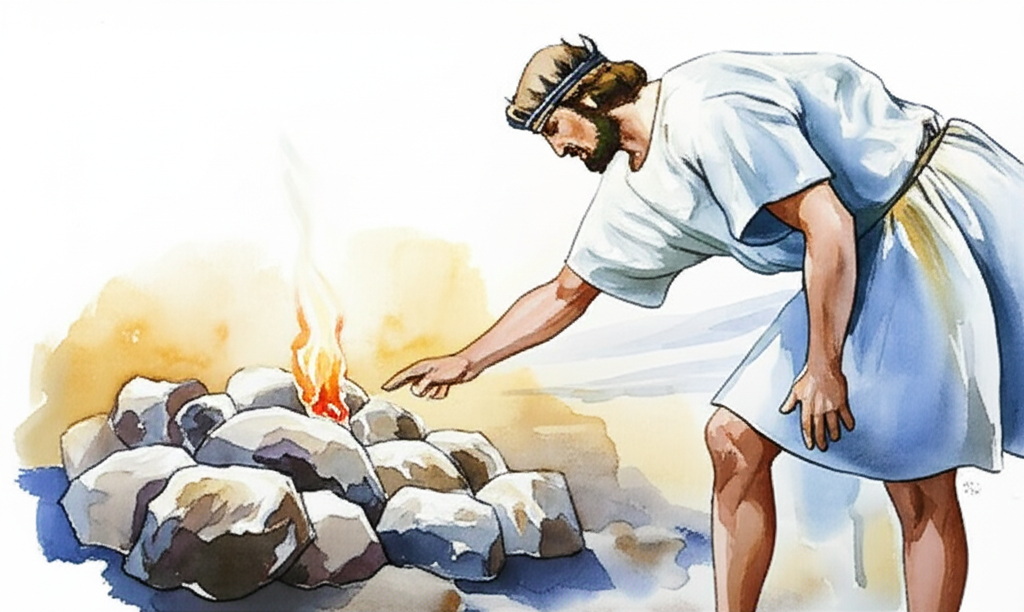
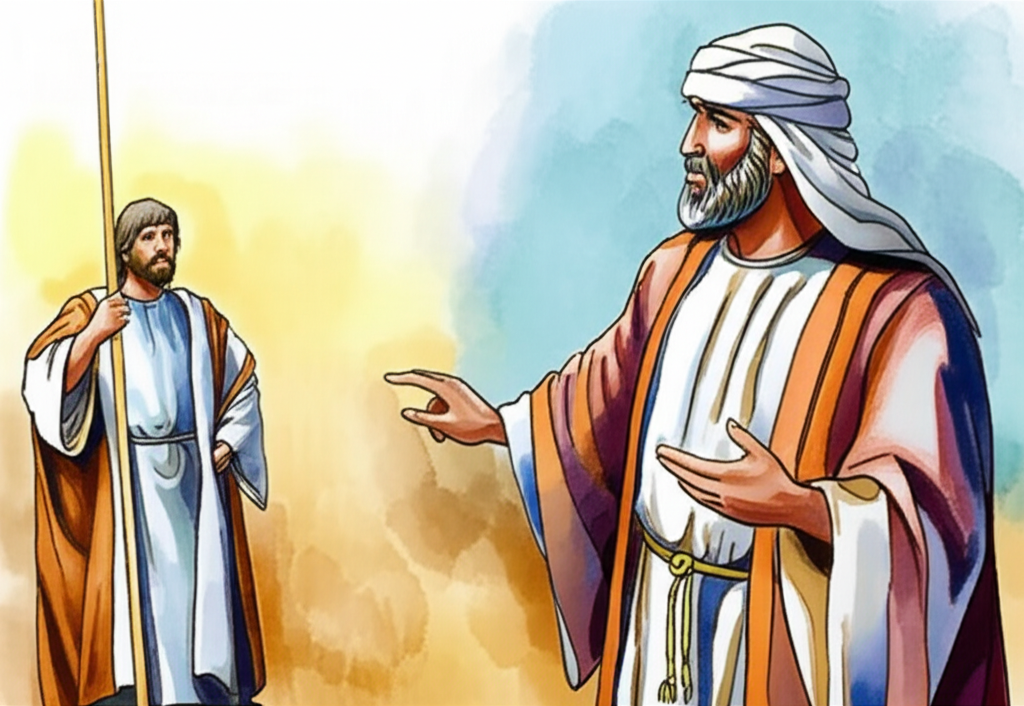
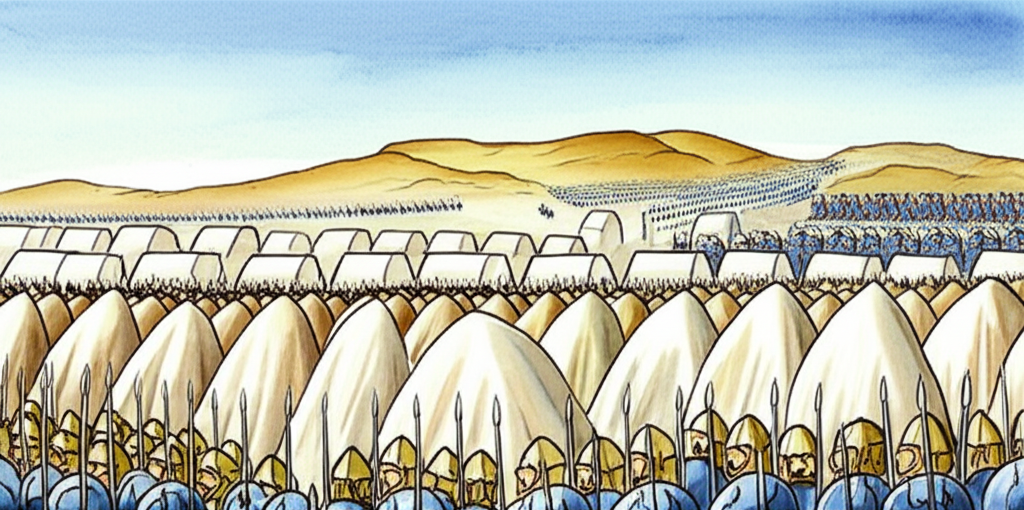
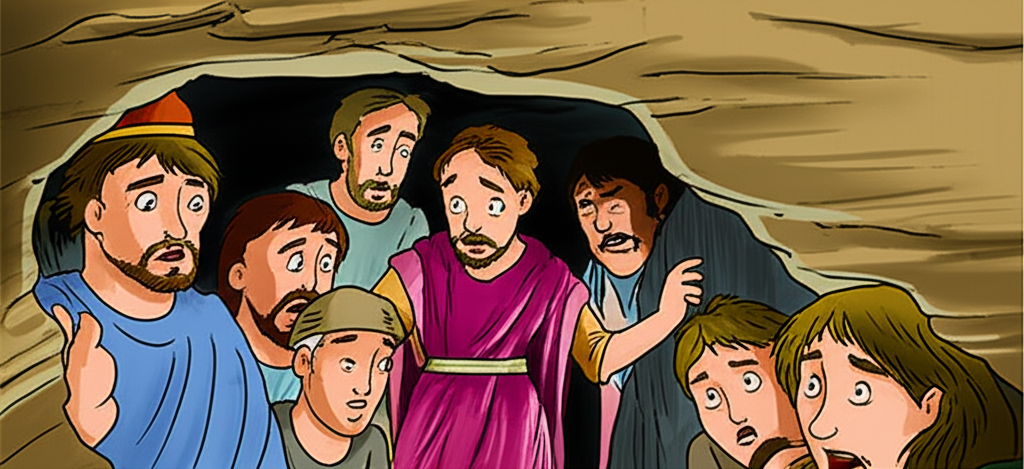
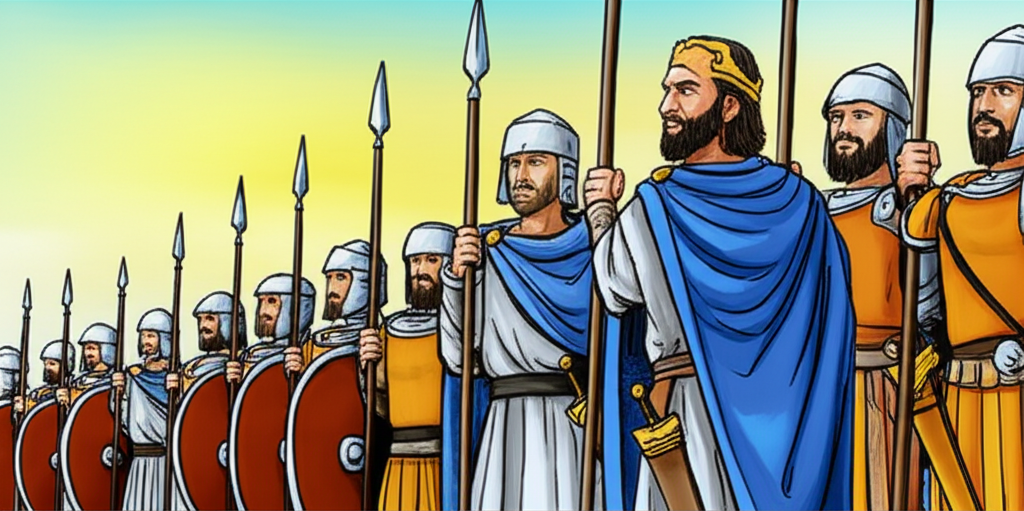
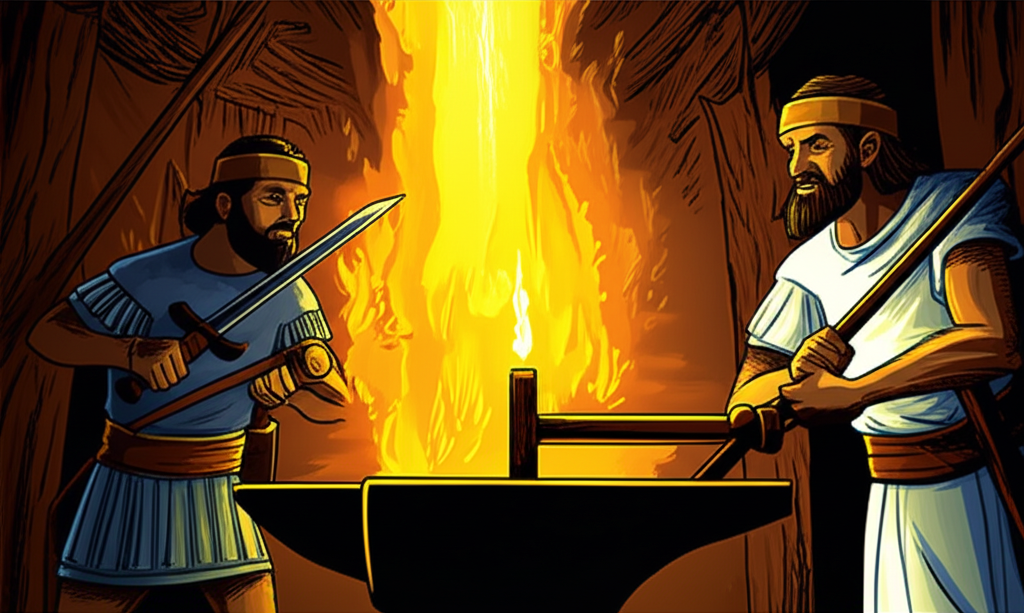

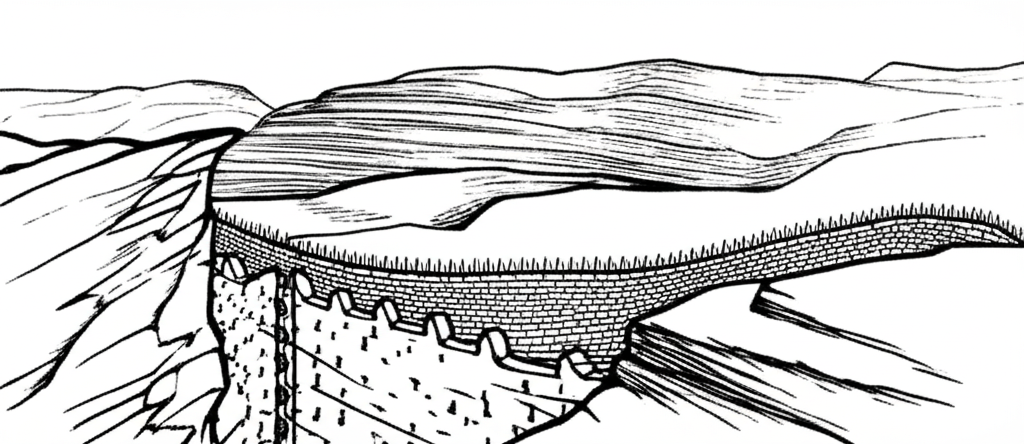
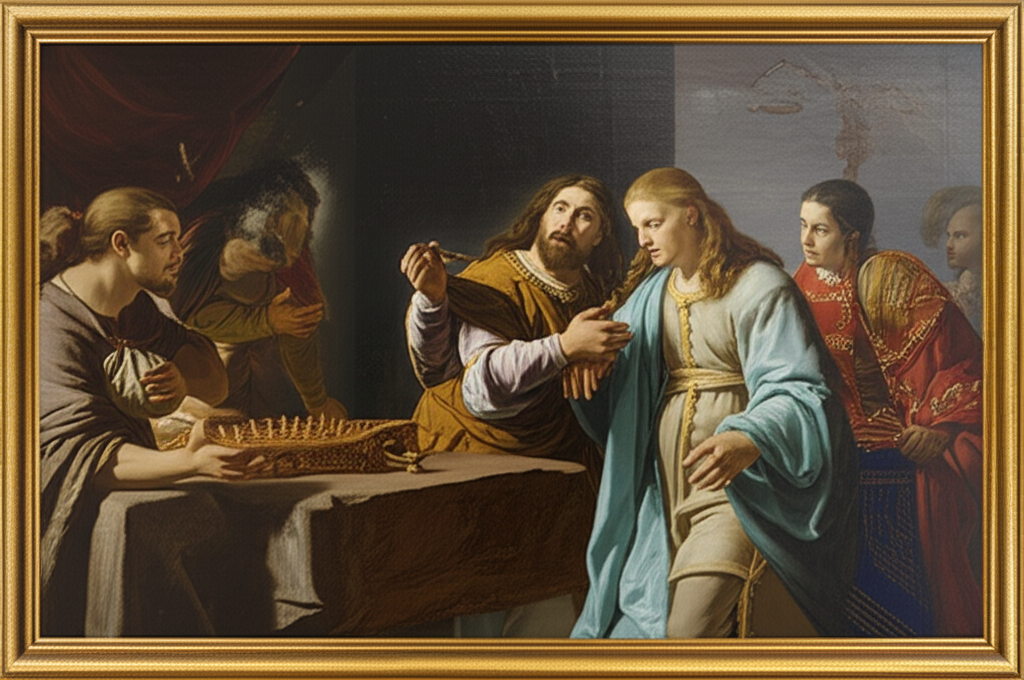
1 Samuel chapter 13 kjv
- 1 Saul reigned one year; and when he had reigned two years over Israel,
- 2 Saul chose him three thousand men of Israel; whereof two thousand were with Saul in Michmash and in mount Bethel, and a thousand were with Jonathan in Gibeah of Benjamin: and the rest of the people he sent every man to his tent.
- 3 And Jonathan smote the garrison of the Philistines that was in Geba, and the Philistines heard of it. And Saul blew the trumpet throughout all the land, saying, Let the Hebrews hear.
- 4 And all Israel heard say that Saul had smitten a garrison of the Philistines, and that Israel also was had in abomination with the Philistines. And the people were called together after Saul to Gilgal.
- 5 And the Philistines gathered themselves together to fight with Israel, thirty thousand chariots, and six thousand horsemen, and people as the sand which is on the sea shore in multitude: and they came up, and pitched in Michmash, eastward from Bethaven.
- 6 When the men of Israel saw that they were in a strait, (for the people were distressed,) then the people did hide themselves in caves, and in thickets, and in rocks, and in high places, and in pits.
- 7 And some of the Hebrews went over Jordan to the land of Gad and Gilead. As for Saul, he was yet in Gilgal, and all the people followed him trembling.
- 8 And he tarried seven days, according to the set time that Samuel had appointed: but Samuel came not to Gilgal; and the people were scattered from him.
- 9 And Saul said, Bring hither a burnt offering to me, and peace offerings. And he offered the burnt offering.
- 10 And it came to pass, that as soon as he had made an end of offering the burnt offering, behold, Samuel came; and Saul went out to meet him, that he might salute him.
- 11 And Samuel said, What hast thou done? And Saul said, Because I saw that the people were scattered from me, and that thou camest not within the days appointed, and that the Philistines gathered themselves together at Michmash;
- 12 Therefore said I, The Philistines will come down now upon me to Gilgal, and I have not made supplication unto the LORD: I forced myself therefore, and offered a burnt offering.
- 13 And Samuel said to Saul, Thou hast done foolishly: thou hast not kept the commandment of the LORD thy God, which he commanded thee: for now would the LORD have established thy kingdom upon Israel for ever.
- 14 But now thy kingdom shall not continue: the LORD hath sought him a man after his own heart, and the LORD hath commanded him to be captain over his people, because thou hast not kept that which the LORD commanded thee.
- 15 And Samuel arose, and gat him up from Gilgal unto Gibeah of Benjamin. And Saul numbered the people that were present with him, about six hundred men.
- 16 And Saul, and Jonathan his son, and the people that were present with them, abode in Gibeah of Benjamin: but the Philistines encamped in Michmash.
- 17 And the spoilers came out of the camp of the Philistines in three companies: one company turned unto the way that leadeth to Ophrah, unto the land of Shual:
- 18 And another company turned the way to Bethhoron: and another company turned to the way of the border that looketh to the valley of Zeboim toward the wilderness.
- 19 Now there was no smith found throughout all the land of Israel: for the Philistines said, Lest the Hebrews make them swords or spears:
- 20 But all the Israelites went down to the Philistines, to sharpen every man his share, and his coulter, and his axe, and his mattock.
- 21 Yet they had a file for the mattocks, and for the coulters, and for the forks, and for the axes, and to sharpen the goads.
- 22 So it came to pass in the day of battle, that there was neither sword nor spear found in the hand of any of the people that were with Saul and Jonathan: but with Saul and with Jonathan his son was there found.
- 23 And the garrison of the Philistines went out to the passage of Michmash.
1 Samuel chapter 13 nkjv
- 1 Saul reigned one year; and when he had reigned two years over Israel,
- 2 Saul chose for himself three thousand men of Israel. Two thousand were with Saul in Michmash and in the mountains of Bethel, and a thousand were with Jonathan in Gibeah of Benjamin. The rest of the people he sent away, every man to his tent.
- 3 And Jonathan attacked the garrison of the Philistines that was in Geba, and the Philistines heard of it. Then Saul blew the trumpet throughout all the land, saying, "Let the Hebrews hear!"
- 4 Now all Israel heard it said that Saul had attacked a garrison of the Philistines, and that Israel had also become an abomination to the Philistines. And the people were called together to Saul at Gilgal.
- 5 Then the Philistines gathered together to fight with Israel, thirty thousand chariots and six thousand horsemen, and people as the sand which is on the seashore in multitude. And they came up and encamped in Michmash, to the east of Beth Aven.
- 6 When the men of Israel saw that they were in danger (for the people were distressed), then the people hid in caves, in thickets, in rocks, in holes, and in pits.
- 7 And some of the Hebrews crossed over the Jordan to the land of Gad and Gilead. As for Saul, he was still in Gilgal, and all the people followed him trembling.
- 8 Then he waited seven days, according to the time set by Samuel. But Samuel did not come to Gilgal; and the people were scattered from him.
- 9 So Saul said, "Bring a burnt offering and peace offerings here to me." And he offered the burnt offering.
- 10 Now it happened, as soon as he had finished presenting the burnt offering, that Samuel came; and Saul went out to meet him, that he might greet him.
- 11 And Samuel said, "What have you done?" Saul said, "When I saw that the people were scattered from me, and that you did not come within the days appointed, and that the Philistines gathered together at Michmash,
- 12 then I said, 'The Philistines will now come down on me at Gilgal, and I have not made supplication to the LORD.' Therefore I felt compelled, and offered a burnt offering."
- 13 And Samuel said to Saul, "You have done foolishly. You have not kept the commandment of the LORD your God, which He commanded you. For now the LORD would have established your kingdom over Israel forever.
- 14 But now your kingdom shall not continue. The LORD has sought for Himself a man after His own heart, and the LORD has commanded him to be commander over His people, because you have not kept what the LORD commanded you."
- 15 Then Samuel arose and went up from Gilgal to Gibeah of Benjamin. And Saul numbered the people present with him, about six hundred men.
- 16 Saul, Jonathan his son, and the people present with them remained in Gibeah of Benjamin. But the Philistines encamped in Michmash.
- 17 Then raiders came out of the camp of the Philistines in three companies. One company turned onto the road to Ophrah, to the land of Shual,
- 18 another company turned to the road to Beth Horon, and another company turned to the road of the border that overlooks the Valley of Zeboim toward the wilderness.
- 19 Now there was no blacksmith to be found throughout all the land of Israel, for the Philistines said, "Lest the Hebrews make swords or spears."
- 20 But all the Israelites would go down to the Philistines to sharpen each man's plowshare, his mattock, his ax, and his sickle;
- 21 and the charge for a sharpening was a pim for the plowshares, the mattocks, the forks, and the axes, and to set the points of the goads.
- 22 So it came about, on the day of battle, that there was neither sword nor spear found in the hand of any of the people who were with Saul and Jonathan. But they were found with Saul and Jonathan his son.
- 23 And the garrison of the Philistines went out to the pass of Michmash.
1 Samuel chapter 13 niv
- 1 Saul was thirty years old when he became king, and he reigned over Israel forty- two years.
- 2 Saul chose three thousand men from Israel; two thousand were with him at Mikmash and in the hill country of Bethel, and a thousand were with Jonathan at Gibeah in Benjamin. The rest of the men he sent back to their homes.
- 3 Jonathan attacked the Philistine outpost at Geba, and the Philistines heard about it. Then Saul had the trumpet blown throughout the land and said, "Let the Hebrews hear!"
- 4 So all Israel heard the news: "Saul has attacked the Philistine outpost, and now Israel has become obnoxious to the Philistines." And the people were summoned to join Saul at Gilgal.
- 5 The Philistines assembled to fight Israel, with three thousand chariots, six thousand charioteers, and soldiers as numerous as the sand on the seashore. They went up and camped at Mikmash, east of Beth Aven.
- 6 When the Israelites saw that their situation was critical and that their army was hard pressed, they hid in caves and thickets, among the rocks, and in pits and cisterns.
- 7 Some Hebrews even crossed the Jordan to the land of Gad and Gilead. Saul remained at Gilgal, and all the troops with him were quaking with fear.
- 8 He waited seven days, the time set by Samuel; but Samuel did not come to Gilgal, and Saul's men began to scatter.
- 9 So he said, "Bring me the burnt offering and the fellowship offerings." And Saul offered up the burnt offering.
- 10 Just as he finished making the offering, Samuel arrived, and Saul went out to greet him.
- 11 "What have you done?" asked Samuel. Saul replied, "When I saw that the men were scattering, and that you did not come at the set time, and that the Philistines were assembling at Mikmash,
- 12 I thought, 'Now the Philistines will come down against me at Gilgal, and I have not sought the LORD's favor.' So I felt compelled to offer the burnt offering."
- 13 "You have done a foolish thing," Samuel said. "You have not kept the command the LORD your God gave you; if you had, he would have established your kingdom over Israel for all time.
- 14 But now your kingdom will not endure; the LORD has sought out a man after his own heart and appointed him ruler of his people, because you have not kept the LORD's command."
- 15 Then Samuel left Gilgal and went up to Gibeah in Benjamin, and Saul counted the men who were with him. They numbered about six hundred.
- 16 Saul and his son Jonathan and the men with them were staying in Gibeah in Benjamin, while the Philistines camped at Mikmash.
- 17 Raiding parties went out from the Philistine camp in three detachments. One turned toward Ophrah in the vicinity of Shual,
- 18 another toward Beth Horon, and the third toward the borderland overlooking the Valley of Zeboyim facing the wilderness.
- 19 Not a blacksmith could be found in the whole land of Israel, because the Philistines had said, "Otherwise the Hebrews will make swords or spears!"
- 20 So all Israel went down to the Philistines to have their plow points, mattocks, axes and sickles sharpened.
- 21 The price was two-thirds of a shekel for sharpening plow points and mattocks, and a third of a shekel for sharpening forks and axes and for repointing goads.
- 22 So on the day of the battle not a soldier with Saul and Jonathan had a sword or spear in his hand; only Saul and his son Jonathan had them.
- 23 Now a detachment of Philistines had gone out to the pass at Mikmash.
1 Samuel chapter 13 esv
- 1 Saul lived for one year and then became king, and when he had reigned for two years over Israel,
- 2 Saul chose three thousand men of Israel. Two thousand were with Saul in Michmash and the hill country of Bethel, and a thousand were with Jonathan in Gibeah of Benjamin. The rest of the people he sent home, every man to his tent.
- 3 Jonathan defeated the garrison of the Philistines that was at Geba, and the Philistines heard of it. And Saul blew the trumpet throughout all the land, saying, "Let the Hebrews hear."
- 4 And all Israel heard it said that Saul had defeated the garrison of the Philistines, and also that Israel had become a stench to the Philistines. And the people were called out to join Saul at Gilgal.
- 5 And the Philistines mustered to fight with Israel, thirty thousand chariots and six thousand horsemen and troops like the sand on the seashore in multitude. They came up and encamped in Michmash, to the east of Beth-aven.
- 6 When the men of Israel saw that they were in trouble (for the people were hard pressed), the people hid themselves in caves and in holes and in rocks and in tombs and in cisterns,
- 7 and some Hebrews crossed the fords of the Jordan to the land of Gad and Gilead. Saul was still at Gilgal, and all the people followed him trembling.
- 8 He waited seven days, the time appointed by Samuel. But Samuel did not come to Gilgal, and the people were scattering from him.
- 9 So Saul said, "Bring the burnt offering here to me, and the peace offerings." And he offered the burnt offering.
- 10 As soon as he had finished offering the burnt offering, behold, Samuel came. And Saul went out to meet him and greet him.
- 11 Samuel said, "What have you done?" And Saul said, "When I saw that the people were scattering from me, and that you did not come within the days appointed, and that the Philistines had mustered at Michmash,
- 12 I said, 'Now the Philistines will come down against me at Gilgal, and I have not sought the favor of the LORD.' So I forced myself, and offered the burnt offering."
- 13 And Samuel said to Saul, "You have done foolishly. You have not kept the command of the LORD your God, with which he commanded you. For then the LORD would have established your kingdom over Israel forever.
- 14 But now your kingdom shall not continue. The LORD has sought out a man after his own heart, and the LORD has commanded him to be prince over his people, because you have not kept what the LORD commanded you."
- 15 And Samuel arose and went up from Gilgal. The rest of the people went up after Saul to meet the army; they went up from Gilgal to Gibeah of Benjamin. And Saul numbered the people who were present with him, about six hundred men.
- 16 And Saul and Jonathan his son and the people who were present with them stayed in Geba of Benjamin, but the Philistines encamped in Michmash.
- 17 And raiders came out of the camp of the Philistines in three companies. One company turned toward Ophrah, to the land of Shual;
- 18 another company turned toward Beth-horon; and another company turned toward the border that looks down on the Valley of Zeboim toward the wilderness.
- 19 Now there was no blacksmith to be found throughout all the land of Israel, for the Philistines said, "Lest the Hebrews make themselves swords or spears."
- 20 But every one of the Israelites went down to the Philistines to sharpen his plowshare, his mattock, his axe, or his sickle,
- 21 and the charge was two-thirds of a shekel for the plowshares and for the mattocks, and a third of a shekel for sharpening the axes and for setting the goads.
- 22 So on the day of the battle there was neither sword nor spear found in the hand of any of the people with Saul and Jonathan, but Saul and Jonathan his son had them.
- 23 And the garrison of the Philistines went out to the pass of Michmash.
1 Samuel chapter 13 nlt
- 1 Saul was thirty years old when he became king, and he reigned for forty-two years.
- 2 Saul selected 3,000 special troops from the army of Israel and sent the rest of the men home. He took 2,000 of the chosen men with him to Micmash and the hill country of Bethel. The other 1,000 went with Saul's son Jonathan to Gibeah in the land of Benjamin.
- 3 Soon after this, Jonathan attacked and defeated the garrison of Philistines at Geba. The news spread quickly among the Philistines. So Saul blew the ram's horn throughout the land, saying, "Hebrews, hear this! Rise up in revolt!"
- 4 All Israel heard the news that Saul had destroyed the Philistine garrison at Geba and that the Philistines now hated the Israelites more than ever. So the entire Israelite army was summoned to join Saul at Gilgal.
- 5 The Philistines mustered a mighty army of 3,000 chariots, 6,000 charioteers, and as many warriors as the grains of sand on the seashore! They camped at Micmash east of Beth-aven.
- 6 The men of Israel saw what a tight spot they were in; and because they were hard pressed by the enemy, they tried to hide in caves, thickets, rocks, holes, and cisterns.
- 7 Some of them crossed the Jordan River and escaped into the land of Gad and Gilead. Saul's Disobedience and Samuel's Rebuke Meanwhile, Saul stayed at Gilgal, and his men were trembling with fear.
- 8 Saul waited there seven days for Samuel, as Samuel had instructed him earlier, but Samuel still didn't come. Saul realized that his troops were rapidly slipping away.
- 9 So he demanded, "Bring me the burnt offering and the peace offerings!" And Saul sacrificed the burnt offering himself.
- 10 Just as Saul was finishing with the burnt offering, Samuel arrived. Saul went out to meet and welcome him,
- 11 but Samuel said, "What is this you have done?" Saul replied, "I saw my men scattering from me, and you didn't arrive when you said you would, and the Philistines are at Micmash ready for battle.
- 12 So I said, 'The Philistines are ready to march against us at Gilgal, and I haven't even asked for the LORD's help!' So I felt compelled to offer the burnt offering myself before you came."
- 13 "How foolish!" Samuel exclaimed. "You have not kept the command the LORD your God gave you. Had you kept it, the LORD would have established your kingdom over Israel forever.
- 14 But now your kingdom must end, for the LORD has sought out a man after his own heart. The LORD has already appointed him to be the leader of his people, because you have not kept the LORD's command."
- 15 Samuel then left Gilgal and went on his way, but the rest of the troops went with Saul to meet the army. They went up from Gilgal to Gibeah in the land of Benjamin. When Saul counted the men who were still with him, he found only 600 were left!
- 16 Saul and Jonathan and the troops with them were staying at Geba in the land of Benjamin. The Philistines set up their camp at Micmash.
- 17 Three raiding parties soon left the camp of the Philistines. One went north toward Ophrah in the land of Shual,
- 18 another went west to Beth-horon, and the third moved toward the border above the valley of Zeboim near the wilderness.
- 19 There were no blacksmiths in the land of Israel in those days. The Philistines wouldn't allow them for fear they would make swords and spears for the Hebrews.
- 20 So whenever the Israelites needed to sharpen their plowshares, picks, axes, or sickles, they had to take them to a Philistine blacksmith.
- 21 The charges were as follows: a quarter of an ounce of silver for sharpening a plowshare or a pick, and an eighth of an ounce for sharpening an ax or making the point of an ox goad.
- 22 So on the day of the battle none of the people of Israel had a sword or spear, except for Saul and Jonathan.
- 23 The pass at Micmash had meanwhile been secured by a contingent of the Philistine army.
- Bible Book of 1 Samuel
- 1 Story of Hannah
- 2 Hannah's song and Prayer
- 3 Story of Samuel
- 4 The Philistines Capture the Ark
- 5 The Philistines and the Ark
- 6 The Ark Returned to Israel
- 7 Samuel Judges Israel
- 8 Israel Asks for a King
- 9 Saul the first king of Israel
- 10 Samuel Anoints Saul as King
- 11 Saul Defeats the Ammonites
- 12 Samuel's Farewell Address
- 13 Saul Fights the Philistines
- 14 Story of Jonathan
- 15 Saul and the Amalekites
- 16 David annointed
- 17 David and Goliath story
- 18 David and Jonathan's Friendship
- 19 Saul Tries to Kill David
- 20 Jonathan Warns David
- 21 David and the Holy Bread
- 22 David in the cav of Adullam
- 23 David Saves the City of Keilah
- 24 David Spares Saul's Life
- 25 Death of Samuel and Abigail
- 26 David Spares Saul Again
- 27 David Flees to the Philistines
- 28 Saul consults the Witch of Endor
- 29 The Philistines Reject David
- 30 David's Wives Are Captured
- 31 Death of Saul